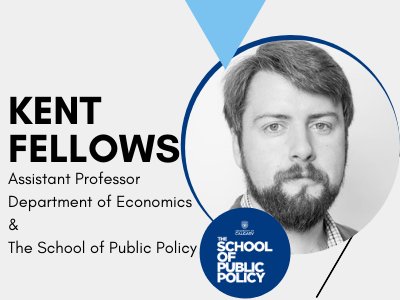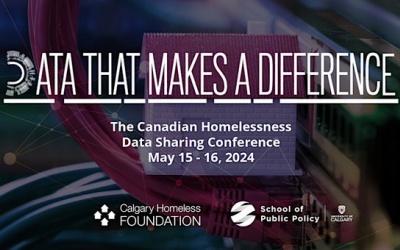Our People Feature: G. Kent Fellows, Assistant Professor in the Department of Economics and the School of Public Policy

You could say Dr. Kent Fellows has become a fixture on the University of Calgary campus.
The Assistant Professor in the Department of Economics and the School of Public Policy has been at the university as a student and professor now for a number of years.
Fellows has been in his current position since September 1. He’s been with the School of Public Policy full-time since 2015. He was also at the School part-time for about two years before that. But he also did his graduate degrees and most of his undergraduate degree at the university.
“So I’ve been kicking around the University of Calgary since the mid-2000s in one form or another,” says Fellows who is from Calgary and went to Springbank Community High School.
“I did my first two years of undergrad at Mount Royal College before it was a university. I did General Studies there and then I transferred to the U of C and went more or less straight into Economics. So as an undergrad I was an Honours Economics and then I did my Masters and then I did my PhD. All at the University of Calgary which is quite rare. It’s atypical for somebody to do those three degrees at one university.
“There really isn’t a typical Masters of Public Policy student. They come from very different backgrounds. We get a lot who’ve done work in the health care sector, so they’ve worked as registered nurses and they’re interested in health policy. We get folks with undergrad political science degrees or economics degrees. They all come in with a shared interest in trying to figure out how to do better policy making and implementation in Canada.
“The students will go off to numerous different career options. We had students that have gone into the public service . . . we’ve had students that have gone into the private sector, trying to help set policy for energy companies and we’ve had students that have gone into other think tanks that end up writing the same kind of research reports that I would write but at other outlets. It’s a very diverse group but the thing that they share is a very passionate interest in policy and they’re all very, very motivated when they come in.”
Today, in his role, he’s also Associate Program Director for The School of Public Policy’s Canadian Northern Corridor research program, which is aimed at studying permissible corridors or the idea of pre-cleared corridors for infrastructure in Canada.
“The idea being that we have a pretty southern corridor that’s come up organically. So you think about the TransCanada Highway, the Canadian Pacific main line. But in other countries they actually do planning of these kinds of things and there’s multi-decade plans for where we want infrastructure to go in setting up corridors so that it’s set aside with some regulatory pre-clearance done to help motivate either private sectors coming in to build transportation infrastructure or the public doing it as a highway or something,” said Fellows.
“The idea really is to try and get more interprovincial trade and more international trade and better infrastructure and support it in parts of the country where we don’t really have that.”
He also teaches a course at the School called Decision Analysis.
“This is for the Masters of Public Policy program and it’s really about teaching the students formal models for decision making. The big one that people might be somewhat familiar with is cost-benefit analysis. I try to teach the students how to formalize some of these arguments bringing economics to it and really in an applied way,” he says.
Fellows’ also concentrates research on energy and environmental economics looking at issues such as carbon pricing and retail gasoline prices in Western Canada.
He has previously worked as a researcher for the University of Alberta’s School of Public Health and as an intern at the National Energy Board.
Fellows can be frequently heard on local and national media lending his expertise on energy and environmental economics and discussing his many published articles.

